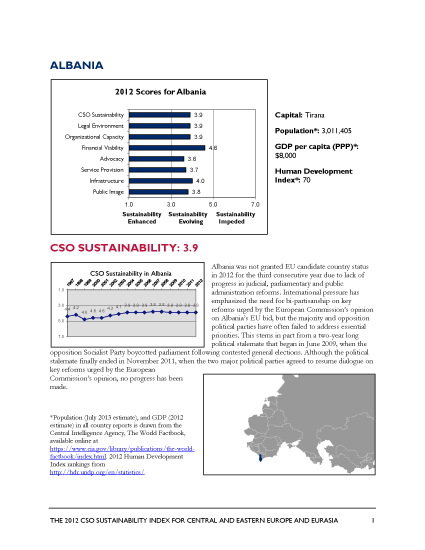CSO SUSTAINABILITY: 3.9
Albania was not granted EU candidate country status in 2012 for the third consecutive year due to lack of progress in judicial, parliamentary and public administration reforms. International pressure has emphasized the need for bi-partisanship on key reforms urged by the European Commission’s opinion on Albania’s EU bid, but the majority and opposition political parties have often failed to address essential priorities. This stems in part from a two-year long political stalemate that began in June 2009, when the opposition Socialist Party boycotted parliament following contested general elections. Although the political stalemate finally ended in November 2011, when the two major political parties agreed to resume dialogue on key reforms urged by the European Commission’s opinion, no progress has been made.
While the broader political environment remains confrontational, Albanian civil society has started to take a more active stance on key issues of public concern. The ACT NOW! (Albanians Coming Together) campaign – an initiative launched by the US Embassy to strengthen democratic principles – encourages advocacy and citizen outreach efforts by CSOs. The lack of tangible advocacy results, however, continues to discourage many CSOs from becoming more actively involved in consultations on various legal and policy initiatives.
Decision makers have generally ignored CSO proposals to improve the legal environment for civil society. Despite its plans, the Ministry of Justice failed to make progress towards creating an electronic Register of CSOs at the Tirana Court of First Instance in 2012. Ambiguous procedures and inconsistent rules on CSOs financial management and inspection provide leeway for state harassment and political pressure.
CSO organizational capacity improved slightly this year. Decreases in donor funding forced CSOs to reconsider organizational management, planning, and outreach efforts to better connect with local communities. Despite these marginal improvements, the lack of a clear strategy for civil society development continues to threaten the third sector’s consolidation. Financial viability is still civil society’s most serious concern, and state authorities, CSOs, and the donor community still lack a coordinated partnership-oriented approach to this issue.
According to the Financial Intelligence Unit, there are 1,651 CSOs registered with tax authorities at the Albanian Ministry of Finance. The Tirana Court, which is in charge of CSO registration, does not keep electronic records and therefore is unable to provide an exact number of registered CSOs.








Comment
Make a general inquiry or suggest an improvement.